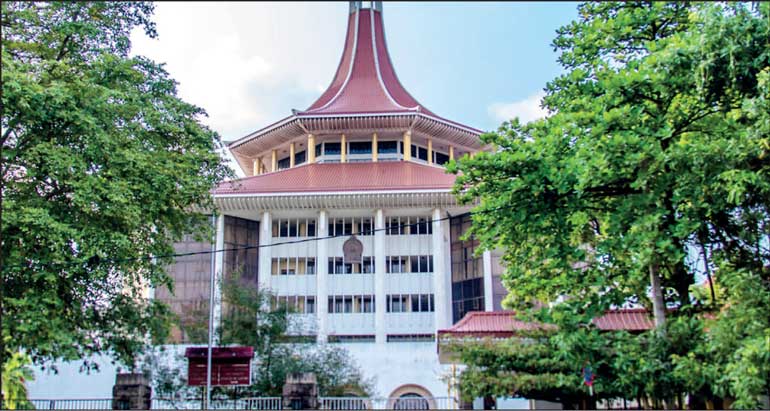Wednesday Feb 18, 2026
Wednesday Feb 18, 2026
Saturday, 9 December 2023 00:08 - - {{hitsCtrl.values.hits}}

Sri Lanka’s Supreme Court recently issued a symbolic ruling that two powerful ex-Presidents,
a Finance Minister, two Secretaries and two Central Bank Governors were guilty of mishandling the economy
With a lack of vigilance and being indifferent to corruption and governance, the civil society stands on both sides of the fence and commemorates another Anti Corruption Day with these sentiments. We, the civil society are running with the hare and hunting with the hounds
 Background
Background
I was invited to deliver the keynote speech on ‘Citizens and CSO Role in Accountability and Governance’ by the Lanka Jathika Sarvodaya Shramadana Sangamaya at its 67th Annual Conference held recently. This article is based on my speech. Sarvodaya Sangamaya is the largest civil society covering more than 15,000 villages for the promotion of good governance devoid of violence.
Introduction
I was intrigued by a statement made by the Buddhist priest who participated in a ‘Dhamma Discussion’ on a television channel last Full Moon Poya Day. This is what he said. “A person who goes to the market to buy coconut shakes all the coconuts in the shop and buys one nut; he squashes all the mangoes and papayas in the shop and buys one fruit. When he goes to cast his vote he does not do any shaking or squashing but, votes for someone/party and says all our family members for generations have been green, blue or red and I followed the same. Then he starts cursing, blaming and lamenting over the party elected for 365 x 5 days.” How did I understand this? We, members of the civil society do not understand our strength, our role and our rights.
Institutional and legal provisions
There are actors, arrangements, acts, laws, regulations, and institutions responsible for combating corruption. There are circulars issued on matters from admission to Grade 1 of a school to buying a ship or an airplane. Every successive government has added to the existing legal arrangements, legislations and institutional structure to ensure transparency, accountability and governance. Parliamentary Committees, Presidential Commissions/Committees are being established in abundance. There are a host of agencies, courts, police, commissions, and authorities. Opinion makers, whistle blowers, political parties, INGOs, national movements galore. Ours is the only country that elected a Government of Good Governance.
Missing link
But, corruption is rampant and growing faster than the pace of anti corruption institutions. The missing element in the equation is actors outside the government, the civil society, and civil society inaction. When it comes to corruption, we, as civil society members lament; curse; blame; find fault with; call names. But, we have a tendency to feel that we are isolated, small, powerless, disorganised, without adequate means and unable to do much to raise voice or act against corruption.
A few weeks ago, Sri Lanka›s Supreme Court issued a symbolic ruling that two powerful ex-Presidents, a Finance Minister, two Secretaries and two Central Bank Governors were guilty of mishandling the economy. The verdict was the result of two petitions filed by corruption watchdog Transparency International Sri Lanka (TISL) and a few civil society activists. This exhibits that the civil society can and has a role to play much more than one thinks, against corruption related actions committed by a person/persons however much powerful.
The importance of civil society
The contribution of Civil Society Organisations (CSOs) ranges from awareness-raising to conducting prevention campaigns to participation in policy formation and monitoring of the implementation. CSOs are especially engaged in empowering citizens and exerting pressure on governments. Such interventions are crucial in a mission of combating corruption, for building capacity and supporting institutional reform.
In recent years, there have been calls for strengthening the framework for the participation of civil society. The right to civil society participation in policy-making processes is recognised internationally:
When it comes to corruption, we, as civil society members lament; curse; blame; find fault with; call names. But, we have a tendency to feel that we are isolated, small, powerless, disorganised, without adequate means and unable to do much to raise voice or act against corruption
In 2014, the UN Human Rights Council adopted a Resolution stressing this issue, and tasked to develop a study to highlight best practices and recommendations for further action. The study states that public participation includes the right to be consulted at each phase of legislative drafting and policy-making; to voice opinions and criticism; and to submit proposals aimed at improving the functioning and inclusivity of all state bodies.
Civil society participation in public affairs is integrated into Article 25 of the International Covenant on Civil and Political Rights. The OHCHR has issued implementation guidance for countries.
2030 Agenda for Sustainable Development recognises that progress in promoting sustainable development requires strong partnerships across society. Goal 16 aligns with the broader human rights framework. The reduction of corruption and bribery (Goal 16.5) and the development of effective, accountable and transparent institutions (Goal 16.6) have been bundled with ensuring responsive, inclusive, participatory and representative decision-making (Goal 16.7). Anti-corruption efforts cannot be successful without meaningful participation. The UN Convention against Corruption (UNCAC) has long recognised the role of civil society in combating corruption by calling on governments to increase transparency, improve public access to information, and promote public contributions to government decision-making processes.
In the words of Peter Eigen, co-founder of Transparency International…… only an effective coalition of state, business and civil society can bring transparency and accountability to governance, not only to fight corruption, but other ills of globalisation too, including injustice and inequity, poverty, violence, conflict, environmental destruction and climate change. The right for peaceful protest and freedom of expression is enshrined in the Sri Lankan Constitution. The Right to Information Act, Anti Corruption Act, etc. are part and parcel of the Constitution.
Which side of the fence does civil society stand?
According to circulars issued on school admission, proof of residence within close proximity is well known. It is so well known that parents start preparing forged documents since the day a child is conceived. The result is passing bribes in cash, kind and sexual favours, thus, depriving admission to genuine children residing within the approved limits. Does the civil society stand with corruption or on the other side of the fence?
I treat public sector employees as an integral part of civil society. They are educated, made into men of worth with public funds. Their remuneration, cost of training and welfare before and after retirement are all looked after by the civil society. Their dedication, commitment and service readiness matters a great deal to the civil society. Public servants get various concessions and perks such as medical leave, free holiday railway warrant, etc. Public servants obtain medical leave on the pretext of being ill and get a holiday warrant and visit the cool climes with their family on holiday. The public who arrive seeking his service is sent back, disappointed and empty handed.
As we know, the partially successful ‘Aragalaya’ was launched against corruption, corrupt practices and a corrupt lot. During the Aragalaya period, I went to the Water Supply Board branch near my residence to make a payment to get the water meter shifted. I was asked to stand in a queue. As I reached the counter to make the payment, the officer said that I must go to the other counter and get a voucher. So, I joined the second queue. I got the voucher and rejoined the first queue. As I reached the counter, the officer said they are closing as they have to go to Gota-Go-Gama to protest against the corrupt lot. I was nonplussed.
Civil society is represented by 225 elected and nominated Members of Parliament. There are watchdog committees to inquire into wrongful, irregular actions committed by public institutions. Committee on Public Enterprises (COPE) and Committee on Public Accounts COPA) are prominent. We the civil society watched and read the proceedings of these Committees on print, electronic and social media with spontaneous sounds of ‹oohs› ‹aahs› ‹woohoo› and ‹oops›. Unfortunately, we in the civil society are deprived of such details after the COPE Chairman sealed his lips with his index finger.
Civil society is the loser of the intended benefit of a government policy/program.
Recent news items appeared in the media about deteriorated quality and standards of gas cylinders causing several deaths, accidents and injuries to the public. A few weeks earlier, it was reported that a schoolgirl after celebrating her 6th birthday with the teachers and her classmates ended her life due to the washbasin falling on her. The basin was not properly fixed to the wall. Someone in the process has pocketed a part of the money allocated by the Ministry. It is the civil society that is at the receiving end of such tragedies caused by the inapt, corrupt mean actions of the public servants.
With a lack of vigilance and being indifferent to corruption and governance, the civil society stands on both sides of the fence and commemorates another Anti Corruption Day with these sentiments. We, the civil society are running with the hare and hunting with the hounds.
(The writer is former Secretary of Plan Implementation Ministry. He can be reached on [email protected])